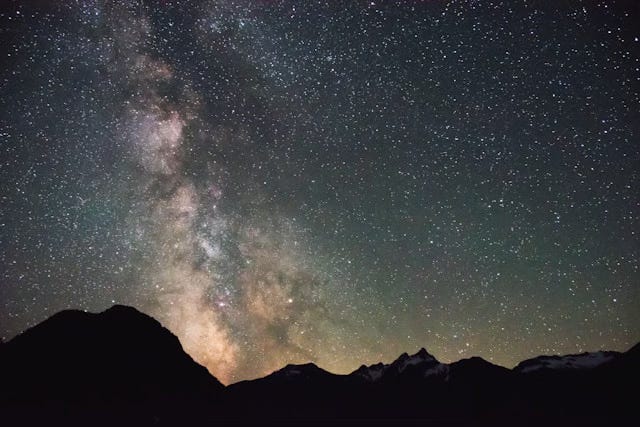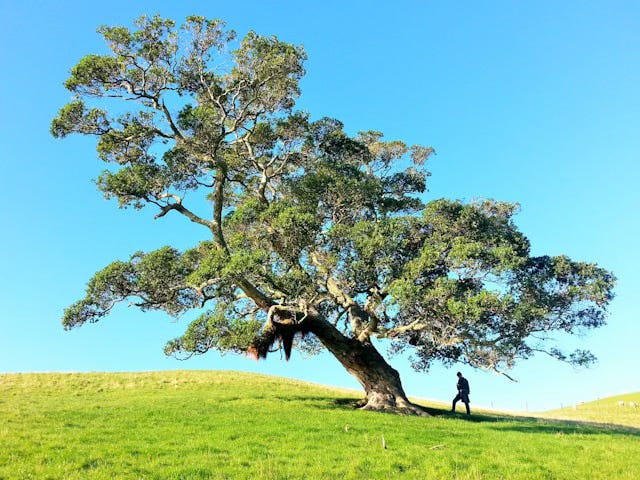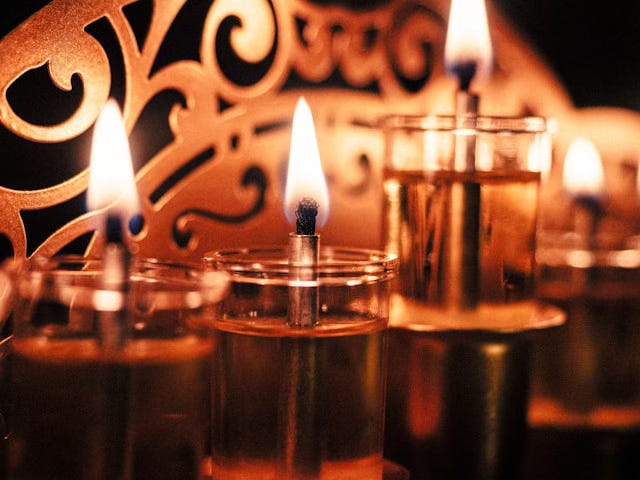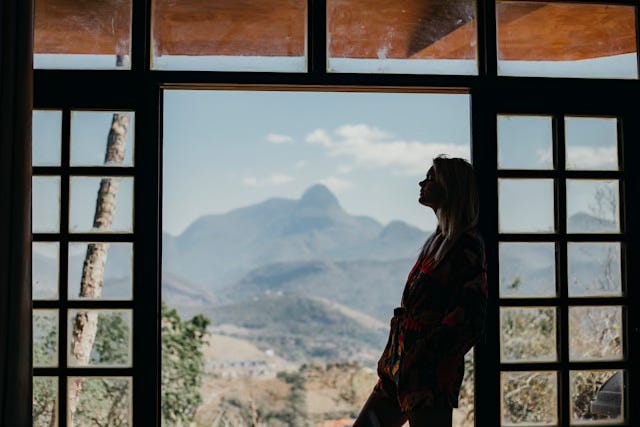Is There Such a Thing as Intergenerational Health?
Trying to find answers in religions and cultures that aren't mine and then through a framework of Family Constellations Therapy, I wonder if we can heal ourselves and our ancestors non-linearally.

I’m continuing to think a lot about what health really means to me, and I find myself thinking about intergenerational health. I know this, essentially, through the lens of trauma, but just as there is a growing awareness of Post-Traumatic Growth that exists alongside Post-Traumatic Stress, there also must be intergenerational healing alongside the intergenerational trauma.
I understand intergenerational trauma through both sides of my family. Matrilineally, there’s a Holocaust survival history. Patrilineally, there’s a history of familial abuse and suicical depression. For many years, I have worked to understand my own experience, particularly (but not only) of depression, through the lens of how this trauma has been passed down to me. But this narrative is limited and I find myself increasingly drawn to frameworks that consider a non-linear, circular, reciprocal approach to healing.
I found myself initially drawn to stories, rituals, belief systems, practices that I cannot call my own. I can’t pretend to understand them deeply or to accurately express them. I can’t embody them although I can respect them. In my first draft of this essay, I wrote about how I understand beliefs I’ve learned about that come from Lakota ceremonies, Yoruba spirituality, Day of the Dead and Hungry Ghost festivals, Andean Despacho ceremonies, Tibetan Buddhist karma … I attempted to explain through each of these my comprehension of how these practices are used to relieve an individual’s present grief, pain, and suffering by relieving the suffering of ancestral spirits, suffering so often unarticulated and known only in the body. But I erased all of those paragraphs because the truth is that I would be inadequately, if not entirely, explaining beliefs that aren’t really mine to express. I erased them because not only are these not my belief systems, these are not my culture nor my heritage, but also because I was not raised with any articulated belief system, with any traditions or rituals. I was certainly not raised to communicate with the ancestors nor even to communicate with the living elders nor to talk about the ancestors or to ask questions of the elders. I was raised to talk about others, not to them.

My father comes from a long line of Italian Catholics. Catholicism taught him that time flows in a straight line: from the creation of the world, through human history, to a singular Judgment Day when all souls are reconciled. This linear view of time emphasizes a divine plan with a clear beginning, middle, and end, rooted in the belief that salvation unfolds through a timeline ordained by God. The focus is on progression: humanity moves forward toward redemption, with an ultimate reckoning where individuals are judged for their earthly deeds. In this framework, the past is not forgotten but forgiven through sacraments like confession and absolution. The ancestors exist, but they are part of a larger communion of saints or souls in purgatory, awaiting purification and eventual entry into heaven. The relationship with them is indirect, mediated by prayers and masses offered on their behalf. This view holds a reverence for tradition and legacy, yet it rarely invites active engagement with the ancestors as ongoing presences; instead, it looks upward to God and forward to the promise of eternal life. Or at least that’s as much as I’ve been able to understand of this religion that I never practiced.
When my dad told stories about Catholic beliefs, they were told with extreme sarcasm. Until his last decade or so, I believed that he didn’t believe in God or in religion at all. In the last decade, I came to understand that although he found all religion distasteful, it wasn’t true, perhaps, that he did not believe in God. It wasn’t true that he hated God, as I once wrote in a book of mine. He believed in something, something that he was never really able to articulate, and he believed in it more when his own mother died, and he believed in it even more when he got closer to his own death. I believe that Catholicism harmed him, and I wonder if I could heal my own understanding of religion today, if that would work backwards and heal his religious trauma?
My mother was raised Jewish but I don’t know how much of that had religious undertones as opposed to cultural practices and know only that as an adult she doesn’t believe in nor practice the religion. My grandfather escaped the Holocaust and came to America at a time when survival meant silence. What had happened to him, to his family, to the Jewish people at large was not talked about—not in public, not in private, not in whispers, not at all. Silence was the price of assimilation, of safety, of forward motion. This silence, however, did not erase the pain; it simply buried it, leaving it to ripple through the generations in unseen and unacknowledged ways.
I said something a few years ago to my mother about my grandfather’s trauma, and her response was that he didn’t have any. It forced me to pause because, for me, the experience of his trauma was so obvious as to not even be questionable. What was obvious for her was the opposite. Her understanding was different, perhaps because when an entire group of people has experienced something so unspeakably traumatic, the only way to survive is to not focus on the trauma. Someone else always has it worse and so there must be gratitude. To acknowledge the trauma while still in the grips of the trauma would be immobilizing, and to become immobilized would mean to fail to survive. So, there is no trauma, you do not discuss the trauma, you do not comprehend it as trauma.
To me, it is obvious not only that his experience was one of trauma but that the silence around it was itself a trauma. Jewish trauma, particularly for Holocaust survivors and their descendants, is often described as a rupture: the breaking of family ties, cultural continuity, and the sacred rituals of mourning. My mother’s parents practiced the rituals of the religion but it felt devoid of belief or feelings. Candles were lit on Shabbat mechanically, not sacredly. We went to their house for dinner on Passover and Hannukah and my grandfather wore a kippah and read some stuff in Hebrew but I was never told what any of it was supposed to mean. Antisemitism existed and was experienced but it was swallowed as fact, not acknowledged, not discussed. In that silence, intergenerational trauma took root.

How does Judaism understand the potential for healing past generations through actions taken today? Judaism teaches, I think, that while we cannot change the past, the living have the power to honor and remember their ancestors through ethical actions, prayers, and rituals that connect the generations. Tikkun olam (repairing the world) emphasizes the responsibility of each individual to contribute to the betterment of society and the future, rooted in the belief that our actions today build on the legacy of those who came before us. Teshuva (repentance) allows individuals to rectify their own wrongs and, in doing so, bring dignity to their family’s name, demonstrating a continuity of values. Through yizkor prayers, recited on major holidays, Jewish people explicitly remember their deceased loved ones, often committing acts of charity and prayer in their memory, which serve to honor and elevate their legacy. Similarly, tzedakah (charitable giving) in an ancestor’s name reinforces the idea that their influence continues to inspire righteous acts. While Judaism tends to focus on shaping the present and the future, these practices do reflect an enduring belief in the interconnectedness of generations and the ability of the living to honor the memory and impact of their ancestors through meaningful actions.
Or, at least, that’s the best I have come to understand it, this religion that like Catholicism I was never taught nor really invested myself in learning. Maybe I am getting this all wrong. Being Jewish might have been passed down to me matrilineally, but I have no deeper connection or understanding or claim to it than I do to Lakota, Yoruba, or Tibetan Buddhist concepts. Those around me who might judge these things would be less inclined to judge me as appropriating the Jewish culture than these other cultures, since I was technically born into a Jewish family, but the truth is it doesn’t really belong to me.
So, maybe I’ve gotten a lot of that wrong, but I share it anyway to explain to you the essence of what I’m drawn to here. It’s this idea of a ripple effect that may appear to move outward from a central spot, but the whole still lake is actually altered as a result. I am drawn to the idea that in my lifetime I have experienced inexplicable pain … pain that I have called trauma from specific experiences but pain that probably has deeper roots in generations before me (and in the cultural, systemic pain of all suffering beings across time) … and I am drawn to the idea that I do not have to understand or define the root of this pain to heal it, that I can use practices and rituals to heal myself and in doing so, it’s as though I go back in time and heal the root of it. Essentially, that by removing the root cause of the pain, I create a new historical narrative that has no pain or trauma, and that this then trickles back to me so that I am healed. Healing me changes the story so that I no longer need healing.
I don’t know if any of the cultural beliefs I’ve been drawn to really capture that but it’s the hint of it that captures my interest. I don’t have a religion, a spiritual belief, a set of practices that help me make sense of the world. The closest thing I have, probably, is psychology. I have studied human psychology in depth, much more so than I have ever studied any religion. I have referenced psychology to understand myself, to understand my pain, to understand my world. It’s why it is so obvious to me that my grandfather experienced trauma; this is simply the language that I know the same way that my dad’s mother knew the language of Catholicism, that my mom’s dad spoke Hebrew on certain days of the year.

There are, of course, multiple psychological approaches to understanding intergenerational trauma and healing. Family systems therapy gave me a framework that was enlarged by Family Constellations Therapy. Developed by German psychotherapist Bert Hellinger, Family Constellations Therapy draws from systems therapy, psychoanalysis, and phenomenology, to emphasize the profound interconnectedness of family members across generations.
The central premise is that the family operates as a dynamic system, and disruptions within this system—such as unacknowledged trauma, secrets, or exclusion of certain members—create energetic imbalances that can persist over time. These disruptions may manifest as emotional struggles, relational conflicts, behavioral patterns, or even physical symptoms in descendants who unknowingly "carry" the burdens of their ancestors. For example, a person might experience chronic guilt, fear, or self-sabotage without any clear reason in their own life, only to discover through Family Constellations Therapy that these emotions stem from an unprocessed event in their family’s past, such as a miscarriage, war trauma, or betrayal.
Healing in Family Constellation Therapy occurs when hidden patterns within the family system are acknowledged and resolved through symbolic acts. This process might involve recognizing an excluded family member and restoring their rightful place within the family, thereby addressing the systemic imbalance caused by their absence. It can also include offering forgiveness to ancestors or accepting their pain with compassion, creating a sense of closure and peace within the lineage. Additionally, healing often involves separating one’s identity from inherited burdens, allowing the individual to step out of dysfunctional patterns and reclaim their own autonomy. These symbolic acts help restore harmony within the family system, benefiting both the individual and the collective.
Notice the non-linear, reciprocal healing this approach offers? By addressing the unresolved trauma of ancestors, the present generation not only alleviates their own struggles but also provides peace to the ancestors who were caught in cycles of suffering. Similarly, healing oneself can transform the energy of the system, benefiting future generations by breaking cycles of pain.
My father inexplicably got “juvenile diabetes” in his twenties and was ill my entire life. His sister has long been chronically ill, as have her daughter and her grandson. I believe this chronic physical illness across my dad’s family to be rooted in trauma. It is trauma, unhealed, passing through the generations. If I can heal myself right now - physically, psychologically, spiritually - then could this go backwards in time and heal their bodies as well? I’m not sure that I believe this, but I don’t not believe it.
Family Constellation Therapy’s focus on acknowledgment and inclusion reflects a fundamental truth about human connection: unresolved pain does not disappear—it is carried, often in unseen ways, until it is acknowledged and addressed. But, what lies inherent in that is the belief that once acnowledge and addressed, the pain can dissipate. We do not have to continually live in pain, nor do our ancestors. We can, perhaps, experience not only intergenerational trauma but also intergenerational healing. There can, perhaps, be such a thing as intergenerational health.
If you read this far, perhaps you liked the work. The work does take work. It only continues with support, so please consider subscribing. My annual rate starts at $10 per year.





This is so interesting, Kathryn. I was raised in a family in which ancestors drank too much, committed suicide, committed adultery, dropped out of school, etc. My own brother, and three years later, our father, committed suicide. We never talked about anything in our family.The only ancestors I knew about were few and far between. I only know from ancestry sites how many actual relatives I have...cousins I will never know or meet. I have only met one in "real life."I suffered from serious mental illness throughout my twenties and early thirties, getting well very gradually. I ended up breaking the cycle...getting well...become a psychotherapist...raising healthy kids to adulthood. I totally believe in generational trauma. I think it gets passed down in our dna, our way of being nurtured (or not), and through parroting other's behaviors. And I'm sure, there's more to it. I'm retired now, but you made me very curious about family constellations therapy.
Really interesting read thank you, a lot to think about